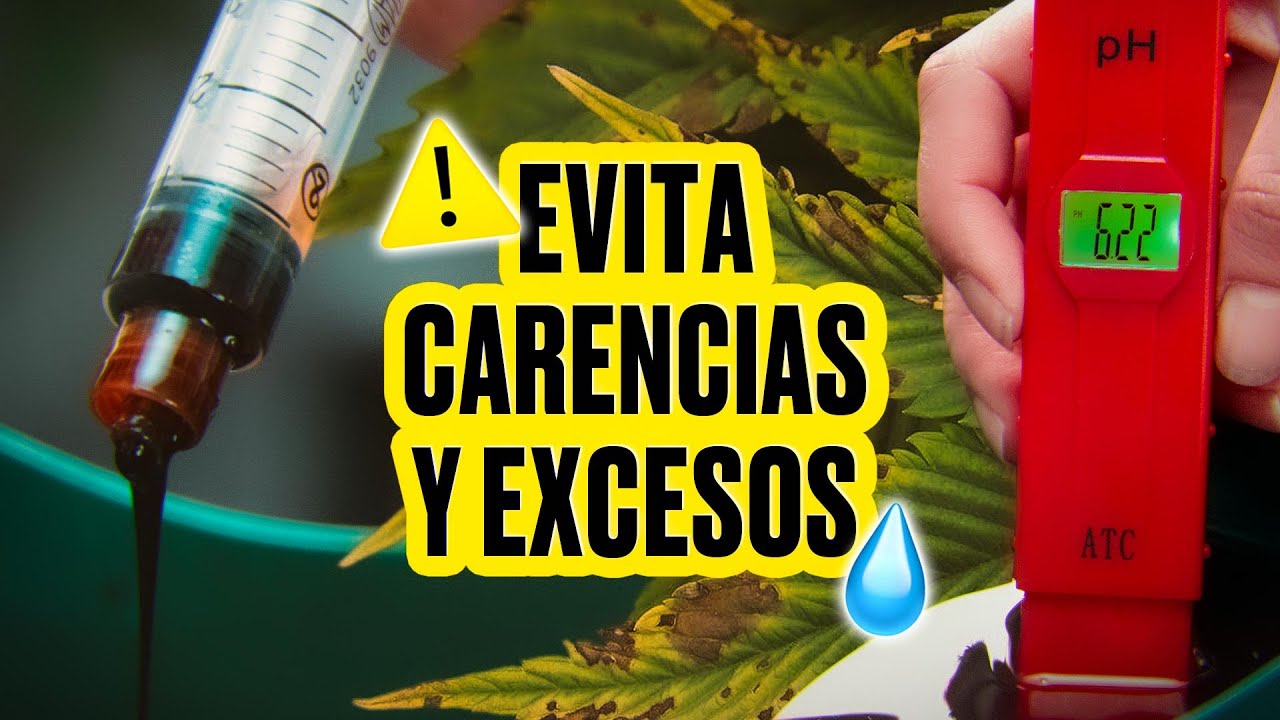Why is it Crucial to Measure pH and EC in Cannabis Cultivation?
Measuring pH and electrical conductivity (EC) in cannabis cultivation is essential to ensure that plants receive the nutrients necessary for optimal development. pH refers to the acidity or alkalinity of the nutrient solution, while EC measures the concentration of mineral salts in it. Both factors directly influence the ability of plants to absorb essential nutrients.
Importance of pH in Cannabis Cultivation
The ideal pH range for cannabis growth is between 6.0 and 7.0 in the substrate. A proper pH ensures that nutrients are available and in balance. If the pH is outside of this range, plants may experience nutrient deficiencies or toxicities , affecting their health and production.
The Relevance of CE
Electrical conductivity (EC) is an indicator of the amount of nutrients in the solution. Maintaining an adequate EC level is crucial, as levels that are too high can lead to root burn, while low levels can result in poor growth. A range of 1.0 to 2.5 mS/cm is generally acceptable for the growth and flowering stages in cannabis.
- Better plant performance
- Prevention of nutritional problems
- Optimizing irrigation efficiency
Therefore, regularly measuring pH and EC allows growers to make necessary adjustments to their nutrient solutions, resulting in healthier plants and ultimately higher quality and quantity of cannabis production.
Consequences of Incorrect pH and EC in Cannabis Plants
pH and electrical conductivity (EC) are two critical factors in the growth and development of cannabis plants. Improper pH can drastically affect the availability of essential nutrients, while incorrect EC can interfere with plants’ ability to absorb water and nutrients. Both conditions can lead to significant negative consequences.
Effects of Incorrect pH
- Nutritional Deficiencies: Too high or too low pH can result in nutrients not being available to plants, resulting in deficiency symptoms such as leaf yellowing or stopped growth.
- Toxicity Issues: In some cases, an extreme pH can cause toxicity by accumulating certain heavy metals, affecting the overall health of the plant.
Impact of Inadequate CE
- Water Stress: Too high an EC causes a salinity environment that can dehydrate the roots, leading to water stress that impairs growth.
- Interference in Nutrient Absorption: An insufficient EC level can create an imbalance in the nutrient ratio, causing plants to not absorb the minerals necessary for optimal development.
Understanding and monitoring both pH and EC is critical to successful cannabis cultivation. Ignoring these parameters will not only affect plant health and yield, but can also lead to significant economic losses for growers.
Identifying Nutrient Deficiencies in Cannabis: Use of pH and EC
Identifying nutrient deficiencies in cannabis crops is a crucial task to ensure their health and optimize their growth. Two key factors in this identification are pH and electrical conductivity (EC). Both parameters directly affect the uptake of essential nutrients by plants, so monitoring them regularly is essential to avoid deficiencies.
Importance of pH
pH refers to the acidity or alkalinity of the substrate where the plant grows. For cannabis, an optimal pH range is between 6.0 and 7.0. If the pH deviates from this range, it can limit the plant’s ability to absorb certain nutrients even if they are present in the substrate. For example:
- A low pH (acidic) can make it harder for calcium and magnesium to be absorbed.
- A high pH (alkaline) can block the availability of iron and phosphorus.
Electrical Conductivity (EC) Evaluation
Electrical conductivity (EC) measures the amount of salts dissolved in the nutrient solution and acts as an indicator of the amount of nutrients available. An adequate level of EC allows the plant to access all the necessary nutrients. In cannabis crops, it is recommended to maintain the EC between 1.2 and 2.0 mS/cm. A level of EC that is too low can signal a nutrient deficit, while a level that is too high can be a sign of overload or salinity.
Controlling both pH and EC is critical to preventing nutritional deficiencies and ensuring that cannabis plants develop optimally. Keeping these parameters within the ideal ranges will allow you to grow healthy and robust plants.
Overfertilization in Cannabis: Symptoms and Effective Solutions
Overfertilization in cannabis occurs when excessive amounts of nutrients are used in the crop, which can wreak havoc on plant health. Growers must be attentive to the symptoms in order to act in a timely manner and avoid irreparable damage. Among the most common symptoms of overfertilization are:
- Yellow spots: The leaves may show yellow or brown spots, especially at the edges.
- Leaf curvature: The leaves may have a curly or curled appearance, showing abnormal growth.
- Burns on the tips: The tips of the leaves may turn brown and dry out, indicating excess nutrients.
- Growth Arrest: Plants may show reduced growth or even stop altogether.
Effective Solutions for Overfertilization
While over-fertilizing can be devastating, there are steps growers can take to remedy this situation. Here are some effective solutions:
- Rinsing the substrate: Washing the substrate with clean water can help remove excess accumulated nutrients.
- Nutrient reduction: It is crucial to adjust fertilizer doses and opt for lower concentrations in the future.
- pH monitoring: Maintaining a proper pH is essential for nutrient absorption; Make sure it’s in the optimal range.
- Use of corrective additives: Some products are designed to help plants absorb nutrients better, making it easier to recover.
Identifying and correcting over-fertilization problems in time is crucial to maintaining the health and productivity of your cannabis plants. Ensuring that the growing conditions are suitable will facilitate optimal growth and prevent the occurrence of these problems.
A Practical Guide to Measuring and Adjusting pH and EC in Your Cannabis Grow
pH and electrical conductivity (EC) are two crucial factors that can impact the health and yield of your cannabis plants. Measuring and adjusting these parameters correctly ensures that your plants absorb nutrients efficiently. In this guide, we provide you with a step-by-step guide on how to carry out these processes effectively.
1. pH measurement
To measure the pH of your nutrient solution, you’ll need a calibrated pH meter . Here are the steps to follow:
- Calibrate the meter according to the manufacturer’s instructions.
- Collect a sample of the nutrient solution.
- Insert the meter probe into the sample and wait a few seconds to get the reading.
2. pH Adjustment
If the pH reading is not within the optimal range (5.5 – 6.5 for soil growing), you can adjust it with the following methods:
- Increase the pH: Use a solution of potassium hydroxide or sodium hydroxide.
- Reduce pH: Apply phosphoric acid or citric acid.
3. Measuring EC
Electrical conductivity (EC) measures the concentration of nutrients in your solution. To measure it, use an EC meter and follow this procedure:
- Fill a container with the nutrient solution.
- Insert the meter probe and wait until the reading stabilizes.


